Most of us don’t give much thought to the arcane technical protocols that make the Internet and its various platforms work. Yet these invisible architectures of code profoundly affect how we can interact with others. They determine what sorts of information we can receive and even how our worldviews and identities are shaped.
Sometimes tech protocols empower us to govern ourselves as commoners and freely collaborate with each other. Think open source software, wikis, and collaborative websites. More typically, network protocols are used to create closed, proprietary corporate platforms that turn us into dependent consumers and victims of data-surveillance.

To learn more about how network protocols can foster digital commoning, I recently talked with the activist-minded programmer Evan Henshaw-Plath, perhaps better known as Rabble (pronouns they and them). Rabble has long been a pioneering programmer for social media platforms and champion of decentralized, open technologies. Our conversation can be heard here, as Episode #65 of my podcast, Frontiers of Commoning. (It is also posted on Rabble’s podcast, Revolution.Social.)
What makes Rabble so interesting is their priorities as a programmer, which differ significantly from those of venture capitalists and Silicon Valley tech firms. Rabble’s ambitions are to build platforms that allow “everyone [to have] access to authentic, private online communities built on care, connection, and sustainable relationships.”
I know, I know -- altruistic claims by tech leaders often inspire groans. Mark Zuckerberg famously touted Facebook as a liberating medium for “connecting people” (while its algorithms fueled social extremism and polarization). Airbnb and Uber once marketed themselves as avatars of the “sharing economy” even though their micro-rental business models prioritized the usual capitalist greed.
But Rabble sees open standards as a way that social media can foster more socially constructive agendas. “From 2004, when Web 2.0 companies started forming, there is just one example that ended up looking like Wikipedia, like GNU/Linux… that ended up as sort of a commons," said Rabble. That example is podcasting, a medium initially conceived of as audio blogging.
Podcasting is a form of "social media that evolved into a well-governed commons," said Rabble, "because no one could privatize and control the technical protocols.” Open protocols allowed a large, autonomous world of podcasters to emerge and flourish because no single company could capture and control the medium.
By contrast, said Rabble, “We have all these other examples of the shitshow that social media have become -- of algorithmic, addictive behavior, and manipulative experiences. In the work that I and a lot of other people are doing today, we are trying to liberate the rest of social media.”
Rabble is the rare techie who actually brings an activist history and commitment to their work. After participating in the Seattle protests in 1999 and the anti-globalization movement, they spent years helping develop Indymedia, the global network of homegrown media focused on social movements and protest.
Rabble later worked at Odeo, a company that pivoted to become Twitter, the micro-blogging platform. They were the first employee and, in effect, Chief Technology Officer, until late 2006, a perch that gave them close-up exposure to the harsh financial realities and technical challenges of social media.
Rabble moved to Wellington, New Zealand, following the Occupy protests of 2011-12, to continue socially minded tech experiments and projects. Why New Zealand? In part because an Occupy-inspired group based there, Enspiral, had built some impressive software platforms for group deliberation (Loomio) and collaborative budgeting (Cobudget).
These days, Rabble’s primary focus is building the next generation of decentralized community apps to help create positive social change. They want the apps to be user-driven and -controlled, and to foster care, connection, and sustainability.
Through their public benefit corporation, Verse Communications, Rabble recently released a decentralized social media app called nos.social, which relies on the open Nostr protocol as a driver of decentralized autonomy.

“Traditional social media platforms treat you as the product—focusing on ad revenues, profits, and engagement metrics,” the Nostr website explains. “On social media platforms like YouTube, Instagram, and TikTok an algorithm is determining what you should see based on the needs of the business, not on what you would like to view. In addition, when content moderation questions arise -- it is the corporation making the decision about the types of content you can see rather than you.”
The idea of open standards for social media was long waved off as silly and impossible, surely because there was so much money to be made by developing proprietary platforms. “The idea that people could live outside of this feudal system seemed unthinkable,” said Rabble. No one believed that open protocols could work, despite a small group of innovators, such as the Internet Archive, Holochain, and Nostr, dedicated to the idea.
“No one used our protocols. We were sort of off in the wilderness. And then Elon Musk took over Twitter, and then everyone's like, holy shit, we have a problem! That was the best thing that could ever have happened [to advance] an open protocol internet-based commons for social media.”
Rabble said they took great inspiration from a 2019 essay, “Protocols, Not Platforms: A Technological Approach to Free Speech,” by Mike Masnick, which explains how many intractable problems of social media – censorship, moderation controversies, user lock-in, commercially motivated algorithms, etc. – could be largely resolved through a regime of open standards, which would let users choose what content and processes they want.
The Nostr protocol goes a long way in this direction. It enables people to manage their digital identities on their own terms, and communicate on global networks, without the types of manipulation, censorship, advertising, and data-surveillance that prevail on most commercial platforms. (Here’s a video presentation explaining Nostr.)

Users are empowered to break out of their captivity to corporate platforms whose practices and technical standards, in the end, are designed for maximum profitability, not user satisfaction. For example, proprietary technical standards on corporate platforms deliberately make them incompatible with other sites, so that users are deterred from leaving for better platforms.
On Nostr, however, you can set up your own email server, app protocol server, and Nostr Relay – essentially a shared, open infrastructure that can interact with the larger world while enabling you to set your own rules – about the kinds of content you want, the social behaviors that are acceptable, the types of content to be deleted, the algorithms that drive content, etc. The protocols let users interconnect with each other on their own terms, and grow in size through network effects, instead of acquiescing to becoming digital serfs on corporate plantations.
The right infrastructure is often essential in expanding the capacity to common as an easy, normal activity. Rabble outlined a hopeful vision for getting digital commoners there, and better yet, actual working code in the form of the Nostr protocol and community apps.
You can listen to my full interview with Rabble here.










Recent comments